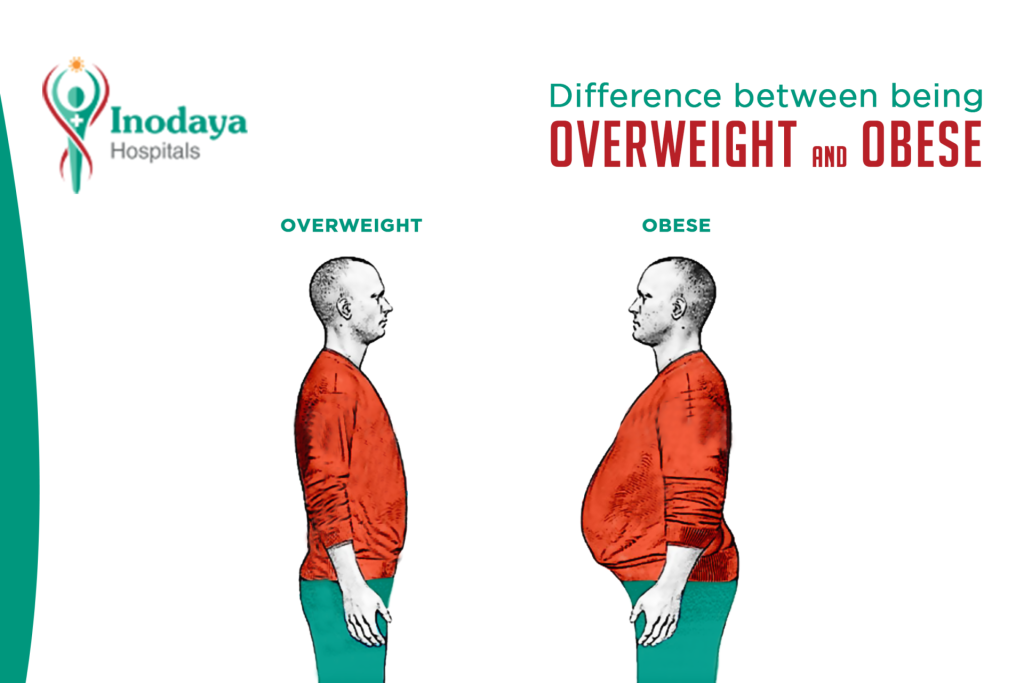Both overweight and obesity implies a condition of excess body weight. Globally, there are more people who are overweight today than before. It is estimated that more than 1 billion adults are overweight and of those, about one-third are considered obese. Unfortunately, overweight and being obese has become much more common in children, too.
Even the terms “overweight” and “obesity” are quite common around us, sometimes it may not be clear what they actually mean. With this view, Dr.Ram Mohan – the best bariatric and metabolic surgeon at Inodaya Hospitals, explains more about being overweight and obesity.
What is the difference between overweight and obese?
As already discussed, overweight and obesity are the conditions having excess body fat than what is considered healthy. The body mass index (BMI), which is calculated from height and weight is a simple way to identify people who are overweight and obese.
However, adults who has a BMI around 25-29 are considered as overweight and adults who has a BMI of 30 or more are considered obese. It is important to note that children and teens become overweight and obese for a various reasons.
Children over the age of 5 whose body mass index is between 5th percentile and less than 85th percentile are considered as heavily weighted. But, children who are in the 85th percentile or less than the 95th percentile are considered overweight. And the children who are equal or greater than the 95th percentile are considered obese -says Dr. Ram Mohan, the best bariatric surgeon.
What causes excess weight?
Overweight is also defined as weighing more than the actual weight based on age, height, and sex. But, some people being overweight does not mean excess body fat such as bodybuilders and athletes can be overweight but not obese.
There are many reasons for being overweight such as overeating, lack of physical exercise, unhealthy eating habits, thyroid problems, and genetic factors. At the same time, psychological conditions can contribute to being overweight.
Does it matter where the excess body fat is located?
Yes. People who have excessive abdominal fat are at greater risk of heart diseases and cancers than people with a similar BMI and carry their fat in other areas of the body. Researches also found that death and disease risk associated with excess body fat can vary among individuals with similar body mass indexes.
Can I control health problems related to overweight or obese by losing weight?
Yes. Dr. Ram Mohan, one of the best weight loss surgeons explained that a moderate weight loss can help to prevent or control numerous health problems including diabetes, high blood pressure and heart problems, etc. The closer you are at normal weight (BMI between 18.5 to 24.9) the greater the health benefits.
What can I do for my overweight or obesity?
Speak to your doctor about your weight loss program. The doctor may recommend the best tips to follow based on your age, height and weight.
Nutritional diet
To lose or maintain your current weight is to eat a well-balanced diet that includes eating a high-protein breakfast and avoiding sugary foods.
Regular exercise
At least 30 minutes of moderate exercise (brisk walking or running) a day is needed to maintain a healthy weight.
Behavioral change
Behavioral modifications such as keeping a food diary of everything that you eat and drink for a couple of weeks and then reviewing your diet. It would be a start to a healthy diet that leads to a healthy weight.
Still unable to lose excess weight? It could be severe obesity. Don’t worry. Bariatric surgery or weight-loss surgery can help people with severe obesity to lose excess body fat, and prevent health complications – says Dr. Ram Mohan, the top bariatric surgeon in Kakinada.
If you would like to know more information, Please contact Inodaya Hospitals





















































